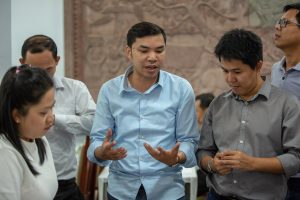 Kampong Cham, Cambodia, December 3-5, 2019 – The Global Green Growth Institute (GGGI) Cambodia team, together with the National Council for Sustainable Development (NCSD) and the Beijing based Global Environmental Institute (GEI), organized a training workshop on sustainable city development. Thirty government officials from the newly established government working group on sustainable cities participated in targeted training modules addressing topics such as waste management, sanitation, green building and low carbon cities. The group included representatives from Phnom Penh, Siem Reap, Battambang, Sihanoukville, Kep, Suong, Bavet, and Kampong Cham.
Kampong Cham, Cambodia, December 3-5, 2019 – The Global Green Growth Institute (GGGI) Cambodia team, together with the National Council for Sustainable Development (NCSD) and the Beijing based Global Environmental Institute (GEI), organized a training workshop on sustainable city development. Thirty government officials from the newly established government working group on sustainable cities participated in targeted training modules addressing topics such as waste management, sanitation, green building and low carbon cities. The group included representatives from Phnom Penh, Siem Reap, Battambang, Sihanoukville, Kep, Suong, Bavet, and Kampong Cham.
In his opening speech, H.E Vuthy, NCSD Deputy Secretary General, underlined the importance of skill development in this area. “The rapid growth of Cambodian cities comes with challenges like traffic congestion, solid waste management, sanitation and shortages energy. This training is crucial as it will provide us the knowledge, skills and examples from other countries on how to plan cities strategically and sustainably to manage their growth.”
Kampong Cham Deputy Governor, H.E Phan Dany, said that Kampong Cham is developing at a fast pace as witnessed by the increase of population and construction of houses and commercial buildings. However, the city is still lacking infrastructure, wastewater treatment and clean energy. She welcomed this training providing participants skills and knowledge to better understand possible solutions.
Trainers from GGGI, line ministries and provinces delivered modules which were based on GGGI’s manual and customized to the Cambodian context. GEI shared clean energy toolkits drawing on experience in Chinese urban centers, while trainees worked in groups on case studies from their respective cities.
As a next step, GGGI will work with the NCSD and the Ministry of Interior to include the modules in government’s existing training curricula, while continuing to support its network of 8 cities in Cambodia in implementing waste, sanitation, mobility and clean energy projects.